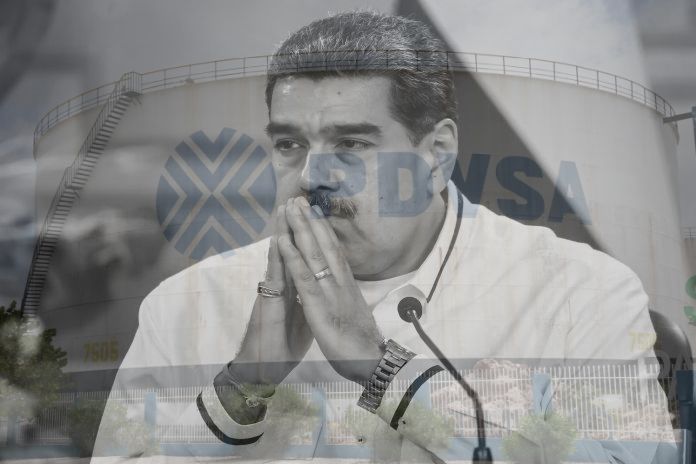- The state oil company continues to diversify its allies in order to navigate the recent reinstatement of US sanctions on the oil industry.
CARACAS, (venezuelanalysis.com) – The Venezuelan oil sector is facing struggles to uplift crude production following the recent reimposition of US sanctions.
The latest OPEC monthly report placed the Caribbean nation’s average May output, as measured by secondary sources. at 822,000 barrels per day (bpd), slightly down from 825,000 in April. Although these figures represent the highest marks over five years, the upward trend has stagnated since March.
The May figures reported directly by state oil company PDVSA stood higher at 910,000 bpd, up from the 878,000 bpd the previous month. On Thursday, Venezuelan oil minister Pedro Tellechea said the industry would soon reach the one million bpd goal.
Caracas has targeted the one million threshold since 2021 but operational setbacks, US sanctions, as well as corruption schemes, have hampered efforts.
Since 2017, Washington has levied financial sanctions, an oil embargo, secondary sanctions and a bevy of other measures meant to choke the South American nation’s most important revenue source. In 2020, crude production hit historic lows before a slow recovery process began at the end of 2021 with Iranian assistance.
In October 2023, the US Treasury Department issued a six-month waiver allowing transactions with Venezuela’s energy sector which temporarily boosted exports. The measure followed an electoral agreement signed between the Maduro government and the US-backed opposition.
However, on April 18 the Biden administration reimposed wide-reaching coercive measures against PDVSA arguing that Caracas breached the agreement after the Venezuelan Supreme Court upheld the political disqualification of far-right candidate María Corina Machado. The Maduro government reiterated that lifting the far-right politician’s ban was never part of the deal.
The US Treasury Department offered firms a 45-day wind-down period (until May 31) which led to a rush of crude cargo exports. In May, Venezuela shipped around 708,900 bpd of crude and fuel as well as 614,000 tons of petrochemicals and oil byproducts, according to Reuters. The number represents a 30 percent increase compared to April.
The Asian market was the main destination with 250,000 bpd while the US was the second largest recipient of Venezuelan oil with an average of 205,000 bpd shipped by California-based corporation Chevron from its four joint ventures with PDVSA. Europe and Cuba received 129,000 and 70,000 bpd, respectively.
Additionally, PDVSA has finished maintenance work in several crude upgraders, bulking its inventories to almost 3 million barrels of Merey 16 and 5 million barrels of diluted crude oil (DCO). The country continues to prioritize gasoline production and imported 68,000 bpd of heavy naphtha and blendstock last month.
US and European corporations have benefited from Washington granting authorizations to firms that already had production or assets in the Caribbean country. Since 2022, Chevron, Spain’s Repsol and Italy’s Eni have obtained specific licenses to expand operations and exports.
In recent months, Washington has also greenlit several more companies, including France’s Maurel & Prom, the United Kingdom’s BP, the US’ Global Oil Terminals and Trinidad and Tobago’s National Gas Company (NGC). Some of these special licenses have been renewed since mid-April and are partly oil-for-debt arrangements.
According to reports, at least 20 other firms have applied for licenses to do business with PDVSA, among them Amos Global Energy. The Houston-based investment fund is awaiting Washington’s approval to complete the purchase of Chinese enterprise Sinopec’s 32 percent stake in Venezuela’s Petroparia oil and gas project located in the Gulf of Paria.
Amos chief executive Ali Moshiri told Reuters the company was “hopeful” of getting the license in the coming weeks following months of lobbying efforts. With this acquisition, the company would control 40 percent of Petroparia and 16 percent of neighboring Petroguiria, with the main objective of ramping up gas production.
The US firm is likewise seeking to participate in Petrosucre, a third oil and gas project in Paria in which PDVSA has a 74 percent stake and Italy’s Eni the remaining 26 percent. Before the 2019 oil blockade, Petrosucre produced around 15,000 bpd of crude oil but currently stands at less than 3,000 bpd. It is the only active project in Paria.
According to Bloomberg, India’s Jindal Steel & Power Ltd is also in line to obtain a license from the US Treasury Department. In April, the New Delhi-headquartered company and PDVSA agreed to partner up to operate the Petrocedeño joint venture, a heavy crude upgrader located in the Orinoco Oil Belt, between Guárico and Anzoátegui states.
Petrocedeño has a production capacity of 202,000 bpd. In alliance with a private company, PDVSA has recently been advancing in replacing a 26-inch pipeline for diluted crude oil.
In July 2021, PDVSA took over the 30 and 10 percent stakes in Petrocedeño held by multinational corporations TotalEnergies (France) and Equinor (Norway), respectively. The participation share that Jindal will acquire was not disclosed.
Jindal had previously secured a contract with Caracas to run operations at Ferrominera Orinoco in Bolívar state with a reported initial investment of US $800,000. The firm targets 600,000 tons of iron ore pellets and briquettes exported per month by the end of the year.
Although Washington has renewed sanctions against Caracas’ oil sector, US businessmen have approached Venezuelan authorities to secure oil deals as PDVSA aims to diversify partners. On Tuesday, Texas-based Sunergon Oil reportedly signed a memorandum of understanding with PDVSA to invest in thousands of oil wells.
Sunergonwill reportedly will take over 3,000 oil wells in the next year and a half after receiving a pre-approval from the US Office of Foreign Assets Control (OFAC). Other Texan firms are allegedly waiting to sign deals as well.
The negotiation was revealed by Latin American Association of Petroleum Entrepreneurs (ALEP) president Alejandro Terán in declarations to a Venezuelan outlet. However, Venezuelan authorities have not confirmed the alliance with the Texan partners.





